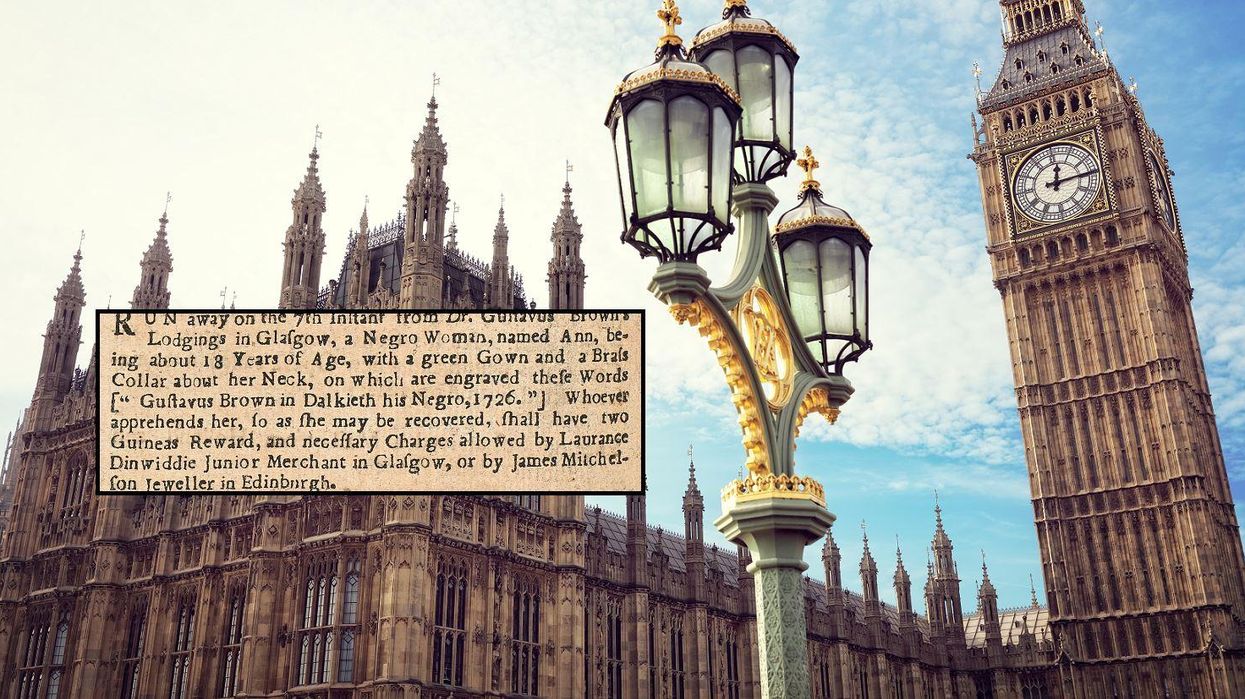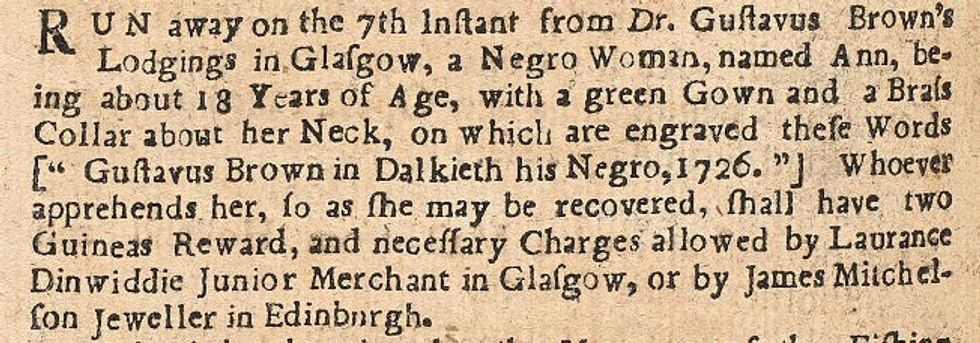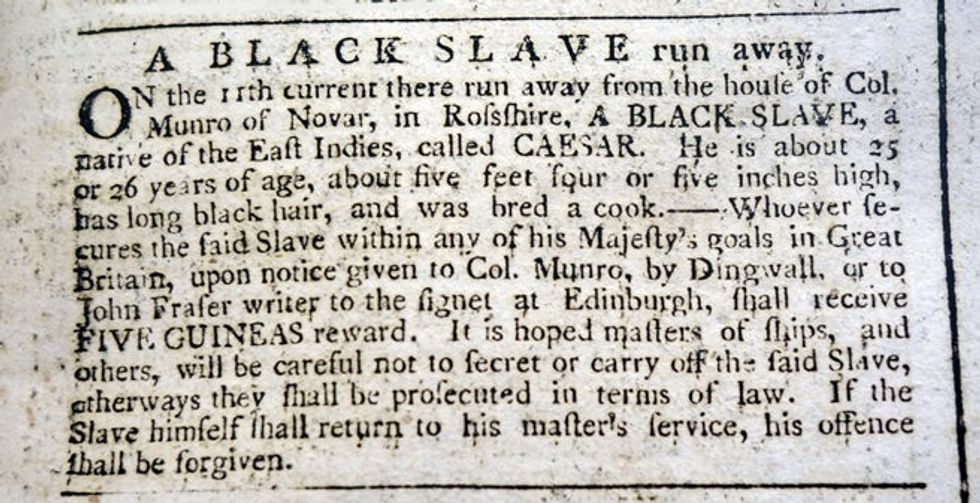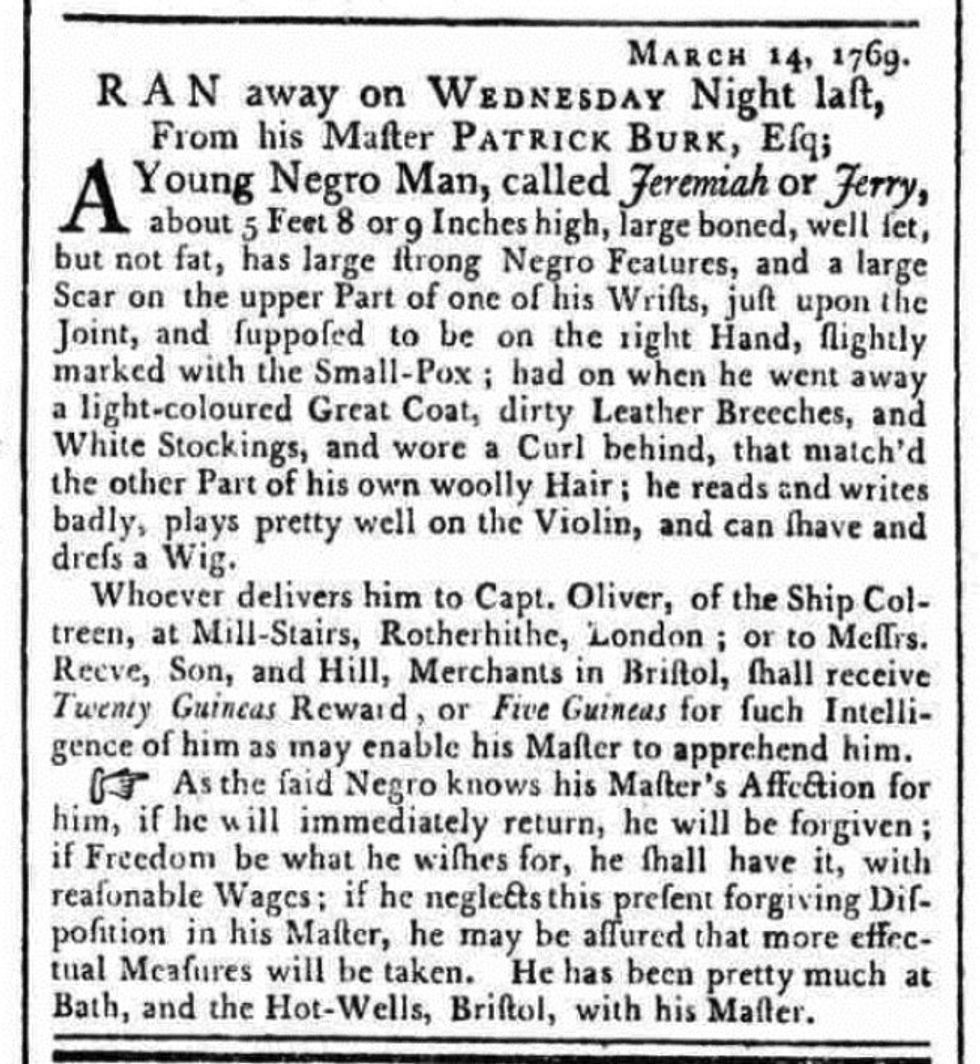News
Narjas Zatat
Jun 13, 2018

Picture:
iStock and Special Collections/ The Mitchell Library/Museums and Collections/Glasgow Life
“Runaway on the 7th from Dr Gustavus Brown’s lodgings in Glasgow, a Negro woman named Ann.”
Researchers at the University of Glasgow discovered hundreds of such adverts posted in British newspapers in the early and mid-eighteenth century, dispelling the myth that slaves didn’t exist in Britain.
The extensive project is spearheaded by history Professor Simon Newman, who sought to prove that “there were a significant number of people of colour in eighteenth-century Britain.”
Most were African or of African descent, while a smaller number were South Asian and a few were indigenous Americans. Many had been brought by their masters from Africa, the Caribbean, North America and India, usually to work as domestic servants, but sometimes as craftsmen or as sailors. A few were free, others were legally bound to work for their masters for set periods, and some were enslaved.
Dozens of Scottish and English newspapers were scoured, often by hand (the deteriorating quality of such texts meant that scanned microfilms were often of low quality) in order to locate over 800 hundred adverts of runaway slaves. The findings were put into a searchable database of newspaper advertisements.
The research is significant because it demonstrates the existence of slaves in the UK – a buried fact in the country’s history. The slave trade, according to Dr Newman, is taught in British schools according to a specific context – plantation slaves in the Caribbean and Americas.
However the project demonstrates that slaves did exist, in a relatively sizeable capacity in the UK between 1700 and 1780.
This elicits yet more questions – if slaves existed in England, how did the abolition of slavery on British soil in 1772 play out? And later in 1833, when the Slavery Abolition Act was passed, making slavery illegal in the British Empire?
Perhaps a more damning indication of the prevalence of slavery in Britain comes from the existence of "For Sale" ads for slaves posted in newspapers. One read "To be sold. A negroe servant about seventeen years of age…" and another read "To be sold, a health negro slave named Prince".
Here's a selection of three slaves who were reported to have run away from their masters in Britain:
1. Ann Mitchell

The advert, from the Edinburgh Evening Courant dated 13 February 1727, from The Mitchell Library, Glasgow, stated:
Run away on the 7th instant from Dr Gustavus Brown's Lodgings in Glasgow, a Negro Woman, named Ann, being about 18 Years of Age, with a green Gown and a Brass Collar about her Neck, on which are engraved these words ["Gustavus Brown in Dalkieth his Negro, 1726."] Whoever apprehends her, so as she may be recovered, shall have two Guineas Reward, and necessary Charges allowed by Laurence Dinwiddie Junior Merchant in Glasgow, or by James Mitchelson Jeweller in Edinburgh.
2. Caesar

The advert, in the Edinburgh Evening Courant, 22 June 1771 reads:
A BLACK SLAVE run away
ON the 11th current there run away from the house of Col. Munro of Novar, in Rosshire, a black slave, a native of the West Indies, called Caesar. He is about 25 or 16 years of age, about five feet four or five inches high, has long black hair, and was bred a cook. -Whoever secures the said slave within any of his Majesty's goals in Breat Britain, upon notice to Col. Munro, by Dingwall, or to John Fraser writer to the signet at Edinburgh, shall receive five guineas reward. It is hoped masters of ships, and others, will be careful not to secret or carry off the said slave, otherways they shall be prosecuted in terms of law. If the slave himself shall return to his master's service, his offence shall be forgiven.
3. Jeremiah

The advert, from Bath Chronicle and Weekly Gazette, 16 March 1769 reads:
RAN away on WEDNESDAY Night last,
From his Master PATRICK BURK, Esq;
A Young Negro Man, called Jeremiah or Jerry, about 5 Feet 8 or 9 Inches high, large boned, well set, but not fat, has large strong Negro Features, and a large Scar on the upper Part of one of his Wrists, just upon the Joint, and supposed to be on the right Hand, slightly marked with the Small-Pox; had on when he went away a light-coloured Great Coat, dirty Leather Breeches, and White Stockings, and wore a Curl behind, that match'd the other Part of his own woolly Hair; he reads and writes badly, plays pretty well on the Violin, and can shave and dress a Wig.
Whoever delivers him to Capt. Oliver, of the Ship Coltreen, at Mill-Stairs, Rotherhithe, London; or to Messrs. Reeve, Son, and Hill, Merchants in Bristol, shall receive Twenty Guineas Reward, or Five Guineas for such Intelligence of him as may enable his Master to apprehend him.
As the said Negro knows his Master's Affection for him, if he will immediately return, he will be forgiven; if Freedom be what he wishes for, he shall have it, with reasonable Wages; if he neglects this present forgiving Disposition in his Master, he may be assured that more effectual Measures will be taken. He has been pretty much at Bath, and the Hot-Wells, Bristol, with his Master.
The research concludes that:
Slavery was not simply an institution that existed in Britain’s colonies: it existed in the towns and countryside of the British Isles and, while hardly common, slaves and bound people were present and visible in Georgian Britain. The fact that a master did not hesitate to publicly advertise a person for sale, or to place an announcement promising a reward for the recapture and return of an enslaved person in newspapers read by friends and neighbours all indicates that such behaviour was unproblematic.
More: 5 examples of extreme white privilege
More: Kanye West said slavery was 'a choice' and people responded perfectly
Top 100
The Conversation (0)













